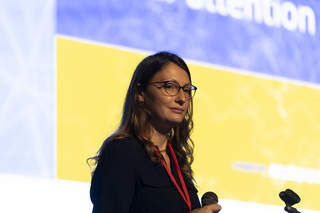Semi-solid extrusion 3D printing of orodispersible caffeine films based on sodium alginate for neonates
4 October 2021
Agnès Roche1, Noelia M Sanchez-Ballester1,2, Adrien Aubert 1, Sylvie Begu 1, Ian Soulairol 1,21 ICGM, Univ Montpellier, CNRS, ENSCM, Montpellier, France
2 Department of Pharmacy, Nîmes University Hospital, France

Apnea of prematurity can be treated with a body-weight-adjusted dosage of caffeine. Semi-solid extrusion (SSE) 3D printing represents an interesting approach to finely tailor personalised doses of active ingredients. Orodispersible film (ODF) is a drug delivery system suitable for infants who cannot swallow. The aim of this work was to obtain 3D printed ODFs by SSE, loaded with a target amount of caffeine, by testing different excipients and printing parameters. Gelling agents (sodium alginate (SA) and hydroxypropylmethyl cellulose (HPMC)) were used to obtain an extrudable wet mass that maintains its shape after extrusion. Two disintegrants (crospovidone (CP) and sodium croscarmellose (SC)) were evaluated with variable proportions (from 25% to 70% w/w) to obtain disintegration times inferior to 3 minutes (European Pharmacopoeia requirements for orodispersible tablets). Different thickness (0.25, 0.5, 1, and 1.23 mm) and infill densities (10%, 20%, 30% and 40%) were also tested on the modelled ODF by computer aided design. Formulation containing 25% caffeine, 9.5% SA, 5.5% HPMC and 60% SC (% w/w) appeared to produce the best shape retention. Increasing proportion of disintegrants did not impact the disintegration time. Therefore, surprisingly, in SSE 3D printing, disintegrants do not display the properties generally expected in conventional forms. By setting the thickness at 0.5 and 0.25mm, the targeted disintegration times were obtained. Further perspectives are being explored to increase and control the dose of caffeine in printed ODFs.